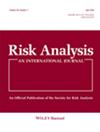The development of resilience research in critical infrastructure systems: A bibliometric perspective
IF 3
3区 医学
Q1 MATHEMATICS, INTERDISCIPLINARY APPLICATIONS
引用次数: 0
Abstract
Critical infrastructure systems (CISs) are the cornerstone of modern cities. Substantial economic losses and social impacts are caused once natural disasters or man‐made disruptions attack the CISs. As a “resilient city” has become an essential theme of communities’ sustainable development, research on resilience and its practice in industries boost the CISs’ capacity to respond and adapt to changing environments. From the Web of Science (WOS) Core Collection, this study screened 1,247 scientific articles related to resilience in CISs and conducted a bibliometric analysis to investigate the evolution and future potential in this field. Topic visualized networks were constructed for CIS resilience using CiteSpace, a dedicated tool for visualizing and analyzing trends and patterns in scientific literature. The results demonstrate collaborative research networks among countries, institutions, main scholar/group networks, and leading journals publishing CIS resilience work. This study also explained how the research interest evolved over the last 20 years and found the current frontiers pointing to “power systems resilience” and “supply chain resilience.” The reasons were discussed subsequently from the perspectives of the influence that natural hazards (based on the EM‐DAT data) and government policies have upon CISs’ resilience work.关键基础设施系统复原力研究的发展:文献计量学视角
关键基础设施系统(CIS)是现代城市的基石。一旦 CIS 遭到自然灾害或人为破坏,就会造成巨大的经济损失和社会影响。随着 "弹性城市 "成为社区可持续发展的重要主题,有关弹性的研究及其在工业中的实践将提高 CIS 应对和适应不断变化的环境的能力。本研究从科学网(WOS)核心数据库中筛选了 1,247 篇与独联体国家抗灾能力相关的科学文章,并进行了文献计量分析,以调查该领域的演变情况和未来潜力。使用 CiteSpace(一种用于可视化和分析科学文献趋势和模式的专用工具)构建了独联体复原力主题可视化网络。研究结果表明了国家、机构、主要学者/团体网络以及发表独联体复原力研究成果的主要期刊之间的合作研究网络。这项研究还解释了过去 20 年间研究兴趣的演变过程,并发现目前的前沿领域指向 "电力系统复原力 "和 "供应链复原力"。随后从自然灾害(基于 EM-DAT 数据)和政府政策对独联体抗灾工作的影响角度讨论了原因。
本文章由计算机程序翻译,如有差异,请以英文原文为准。
求助全文
约1分钟内获得全文
求助全文
来源期刊

Risk Analysis
数学-数学跨学科应用
CiteScore
7.50
自引率
10.50%
发文量
183
审稿时长
4.2 months
期刊介绍:
Published on behalf of the Society for Risk Analysis, Risk Analysis is ranked among the top 10 journals in the ISI Journal Citation Reports under the social sciences, mathematical methods category, and provides a focal point for new developments in the field of risk analysis. This international peer-reviewed journal is committed to publishing critical empirical research and commentaries dealing with risk issues. The topics covered include:
• Human health and safety risks
• Microbial risks
• Engineering
• Mathematical modeling
• Risk characterization
• Risk communication
• Risk management and decision-making
• Risk perception, acceptability, and ethics
• Laws and regulatory policy
• Ecological risks.
 求助内容:
求助内容: 应助结果提醒方式:
应助结果提醒方式:


